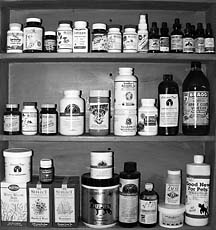Diet became hip in the 1990s. People began studying health food and supplements like never before. One nutrient after another was held up as the latest “miracle” herb or vitamin. This one was supposed to give you energy like never before; that one gave you a photographic memory; and then there was the one that practically melted fat off of your bones. Companies sprang up overnight to meet the demand for these “vital” substances.
In almost every case, the initial wave of interest in the products quietly slipped out to sea within a short time. People tried the powders and pills, and, when they failed to effect a dramatic change within a couple or weeks or months, threw away the half-empty bottles.
It was inevitable that a similar movement would come to the canine kingdom. Look in the dog magazines – the ones with ads. You’ll see page after page of advertisements for dietary supplements of all kinds. Without fail, all of the ads promise to improve your dog’s health. Nine out of ten guarantee to eliminate the single most common complaint of dog owners the world over – itchy, irritated skin. At least half assure the buyer that they will improve the dog’s digestion.
Sometimes, the supplements do actually accomplish these things. When a specific dietary supplement is given to an individual (canine or human) who previously lacked the nutrients or chemicals offered by the supplement, or whose body required a higher dose than was previously available, miraculous improvements in health, appearance, and attitude can indeed take place. But most people have no idea whether they are lacking something before they add it to their own or their dog’s diet!
You’ve gotta have a reason
There are only two legitimate reasons for supplementing your dog’s diet. The first and most common need for supplements is to correct a deficiency which has resulted in poor or compromised health, or low vitality or energy.
That said, it should be added that most holistic veterinary nutrition experts agree that many commercially prepared dog foods offer only low-quality sources of nutrients, and that sometimes, the bio-availability of the nutrients is questionable. This in itself is enough to make many holistic veterinarians recommend the daily administration of a basic multi-vitamin and mineral supplement to any dog who receives nothing but commercial dog food.
Some holistic veterinarians (and human doctors) believe that much of the world’s human food supply is also deficient in vital nutrients, due to intensive modern farming practices. Those people will also recommend the addition of multi-vitamin/mineral combinations to the diet of dogs that are fed an otherwise holistic diet of raw meat and vegetables. This is a philosophic issue debated by scientists and nutritionists the world over; you’ll have to decide for yourself (and your dog) whether the nutrients in most traditionally farmed and manufactured foods are adequate. The best test of the issue is adding a basic multi vitamin and mineral supplement to your (and your dog’s) diet, and taking note of any improvements.
The second good reason to add certain supplements to your dog’s diet is to strengthen his defenses against an anticipated challenge, such as a stressful long-distance move, competition, lactation, or exposure to infectious disease. For instance, vitamin C is widely recognized for its ability to bolster the immune response, and act as an anti-viral agent.
When a dog with a certain deficiency is given the appropriate nutritional supplement, it can quite literally save his life. The correct supplement can also give a sickly or weak dog increased vigor and a new outlook on life. The difficulty lies in determining what the dog needs.
No one can make an intelligent decision about what supplement his or her dog needs based on the products’ label, advertisements, or web site. If you believe each product’s claims, your dog will benefit from each and every supplement on the market. But only a thorough health history intake and examination by a veterinarian, potentially aided by lab tests, can identify nutrient deficiencies. And only the recommendations of an experienced nutrition expert, tailored for your dog, can be considered completely safe and useful.
Obviously, the final decision regarding whether and how you will supplement your dog’s diet rests in your hands. Consider the following common-sense rules of supplementation and choose the simplest, good quality supplements you can find (we recommend a few on the next page). Most importantly, pay attention to your dog! Note all improvements or declines in his appearance and vitality and immediately adjust your ministrations accordingly.
Vitamin/Mineral Supplements
Vitamins are complex substances, essential for normal functioning of the body. There are two types: Fat soluble (A, D, E, and K), are stored in fatty tissue and the liver, and water soluble (B and C), which are eliminated daily through the urine. The body can manufacture its own supply of certain vitamins; others need to be supplied by food and other sources. Veterinary nutritionists more or less agree on the amounts of vitamins needed by dogs to stay healthy.
The latter statement cannot be made for minerals. There is widespread disagreement in the veterinary community regarding what minerals, and in what dosages, are needed for canine health. Scientists only agree that further study is needed, especially regarding dosages for dogs of various breeds and in varying life stages.
Minerals cannot be manufactured by the body. Most people are surprised to learn that mineral deficiencies are more common than vitamin deficiencies. They assist the body in its most critical work, such as energy production, maintenance of electrolytes and fluid balances, and nerve transmission. Trace minerals, including zinc, iron, copper, manganese, cobalt, and iodine, are required by the body only in minute amounts.
WDJ’s pick:
Maximum Protection Vitamins & Minerals
(Dr. Goodpet Laboratories, 8 oz. for about $2.50; 800-222-9932.)
Multi-vitamin and mineral supplementation is generally accepted more readily than supplementation with other nutrients, so it makes sense that there are more brands of multi-vitamin/mineral products on the market than all the other types of supplements put together. Numerous products in this category fit our criteria, but Dr. Goodpet’s product stood out from the crowd for a few reasons.
First, it comes in a powdered form, enabling you to give your dog an amount tailored to his size; the dosage is one teaspoon per 10 pounds of body weight. The powder also makes it easy to sprinkle on and stir into your dog’s food. It includes vitamin C, which is uncommon in the multi-vitamin mixes for dogs. Many veterinarians dispute the idea that dogs need added vitamin C, since their bodies manufacture a certain amount. Most holistic practitioners, however, acknowledge vitamin C’s ability to help the body fight infection and speed healing.
Another good thing about Dr. Goodpet’s formula is what is NOT in it: no preservatives, fillers, anti-caking agents, colors, artificial flavors, or sweeteners.
Not recommended:
Vita Tabs
(Pet Gold Products)
Let’s start with the first ingredient: Dextrose – another word for corn syrup, a sweetener. Considering that the fourth ingredient is molasses, this product is fairly high in sugar, not a supplement that’s high on our wish list, but one that certainly contributes to the product’s palatability. The need for four different artificial colors in a dog vitamin is a mystery.
———-
Probiotics
AKA “friendly bacteria,” these substances help the body digest food, and prohibit growth of harmful fungi and microbes in the gut. The most common probiotic supplement is lactobacillus acidophilus, which can actually help the body overcome the yeast and fungal infections that often occur following a treatment of antibiotics.
WDJ’s pick:
Canine Digestive Enzymes
(Dr. Goodpet Laboratories, 7 oz. bottle, about $15; 800-222-9932)
We had a hard time meeting the simplicity requirement on this one. This product is actually a mix of the four major digestive enzymes and lactobacillus. However, we rejected other brands with more expansive “kitchen sink” approaches. PetGuard, for instance, added alfalfa juice powder to their acidophilus product; Pet Authority added yucca, vitamin C, and papaya to theirs. There’s no harm in any of those, just complexity.
Not recommended:
Bene-Bac Pet Gel
(Pet-Ag, Inc.)
While this product does contain lactobacillus acidophilus and other probiotics, it also contains polysorbate 80, an emulsifier that has been associated with a contaminant that is known to cause cancer in animals; TBHQ, a dangerous antioxidant; and is preserved with ethoxyquin, an antioxidant that has been associated with numerous health problems in dogs.
———-
Fatty Acids
This term refers collectively to the three substances in fat – linoleic acid, linolenic acid, and arachidonic acid – that contribute the most to the quality of a dog’s skin and hair coat. Fatty acids also help prevent cholesterol buildup and heart disease.
WDJ’s pick:
Lipiderm
(Bioglan Animal Products; 60 capsules, about $8; 800-454-0040)
This is a simple formula, comprised largely of fish oil, and focused on a single purpose. ‘Nuf said.
Not recommended:
Linatone
(Lambert Kay)
This product has been around a long time, and it has its fans, but WDJ would like to see it eliminate the polysorbate 80, a questionable emulsifier (see Bene-Bac Pet Gel, above).
———-
Digestive Enzymes
An enzyme, in its general definition, is any one of several different proteins that catalyze a biochemical reaction. Each type of enzyme catalyzes only one substance. For instance, protease is an enzyme used by the body to break down protein; amylase works on carbohydrates, lipase on fats, and cellulase on fiber.
These enzymes are present in raw, fresh foods, but are destroyed by the high temperatures needed to manufacture most commercial dog foods. The body produces its own supply of the chemicals, but many nutritionists believe that giving the body additional enzymes (whether in fresh food or in a supplement form) reduces the need for the body to produce the chemicals, lightening the body’s workload and speeding the digestive process.
WDJ’s pick:
Prozyme
(Prozyme Products, Inc.; 200 gm bottle, about $17; 800-522-5537)
Sometimes, what you want is what you get. Pro-zyme contains only the four most important enzymes: lipase, amylase, protease, and cellulase.
———-
Unique-Source Products
Now we come to a mixed bag of supplements. The products offer vital nutrients, but their makers place more stock in the peculiarity of the nutrient sources than in the nutrients themselves.
Barley Dog, made by Green Foods Corporation, is a good example. The product is not a complete multi-vitamin/mineral supplement; it supplies vitamins A, C, E, B1, B2, and B6, and a few minerals. More significant, say the makers, are the unique qualities of the main ingredient (barley grass), which provide an advantage – a providential synergy – that can’t be explained in terms of recommended daily values.
Super Blue Green Algae (SBGA) takes the cake in the “unique substance” category. We like the product, which is made by Cell Tech, of Klamath Falls, Oregon. SBGA is completely composed of a certain aquatic plant that grows in an Oregon Lake; the algae is collected, freeze dried, and crushed into a fine powder. It contains an array of trace minerals, vitamins B1, B6, B12, C, and D, beta carotene, a number of amino acids, chlorophyll, and nucleic acids, and it’s affordable. We’ve heard great things about the product (see “a Blue-Green Miracle.”), but the way the product is marketed is annoying, to put it mildly.
Cell Tech functions as a “multi-level marketing” system (see “Multi-Level Marketing Mysteries), meaning you can buy it – and get information about it – only from the company’s independent salespeople. The system not only motivates its salespeople to pursue potential clients with fervor, but pits the salespeople against each other in order to win clients. This seems to be why you hear different versions of why and to what extent the product is successful. Critics call the product “glorified pond scum,” but to hear it from the converted, SBGA contains almost mystical powers to heal.
You won’t know until you try
Dog owners also get exposed to a number of supplements that contain substances that do not appear on any list of required nutrients. Most are intended as treatments for specific medical disorders. For example, shark cartilage is said (by the makers of a shark cartilage product) to strengthen weak bone and improve joint mobility.
It’s easy to dismiss these unusual substances as fads – unless you know a dog that has been helped by one. Who knows? Experimentation with these or other supplements, with the knowledge and support of your holistic veterinarian, just might put a sparkle in your dog’s eye and a strut into his step.
Also With This Article
Click here to view “Choosing Canine Supplements Wisely”
Click here to view “Shopping for Nutritional Supplements For Your Dog”
Click here to view “Supplements and NSAIDs for Dogs”
-By Nancy Kerns







I subscribed to your mag for years and have also given it as a gift to my friends. But after years of Raw feeding, I now have a question. I feed a raw diet mixture of meats and bone and supplement with Animal Essential Daily Multi-Vitamin and Animal Essentials Daily Greens since not feeding whole leg quarters with organ meat, and now rarely finding the time to cook liver and kidney and the essentiial 10% organ meats (since thighs are all that I can usually find) I am supplementing with Rachel Rays Kibble and her processed soft food from time to time to make gravy. I have used Animal Essentials for many yrs, however, I am concerned if I am providing my dogs enough organ meat in their diets I am searching for organ meat supplement in powder or dehydrated form of individual or multi to add to their diets. they will not eat raw liver or kidney I always have to demi cook it. Please help me find one you recommend.